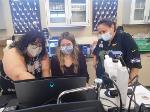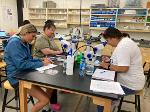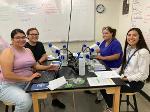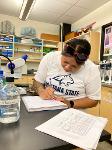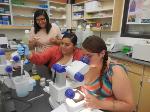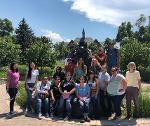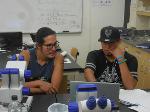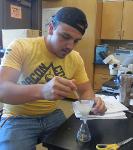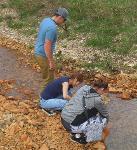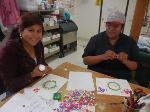Trails To Research
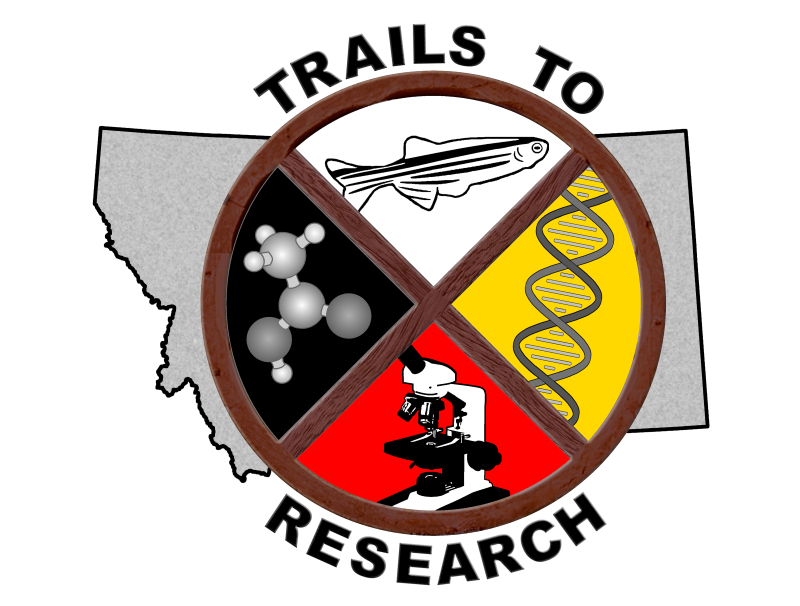
Intensive Introduction to Research for Undergraduate Students:
One Week-long Zebrafish Course

Students from the 2019 summer course at MSU participated in a behind-the-scenes tour at the Museum of the Rockies.
Trails To Research courses provide the opportunity for tribal college students to participate in a week-long Course-based Undergraduate Research Experience (CURE). The courses are held at Montana State University and aim to familiarize Tribal College students with STEM undergraduate research. The only prerequisite is an interest in STEM science.
About Our Course
Students participating in the week long course will design and create their own research projects that investigate how environmental or human health-relevant substances affect the development of zebrafish offspring.
Fish are important indicators of environmental health. Thus, abnormal development of their offspring can be an indicator of toxins in streams and lakes. Fish are also useful in predicting the effects of toxins on the development of humans and can be used as a model organism for human health. In this course, students will observe the development of zebrafish embryos in real time. Students will learn molecular techniques to determine the effects of chemicals found in our environment on the development of the fish and their nervous system.
Who can apply?
This course is open to students from all Tribal Colleges.
The only prerequisite is an interest in a STEM field. No previous research experience is needed!
You will collaborate with the instructors to develop experiments that address your individual ideas. The course will cover laboratory practices, the scientific method, and important laboratory and microscopy skills. You will also learn how to plan, conduct and communicate scientific research.

Students work hands-on with the zebrafish. Above is a student placing a dish in the fish tank to collect embryos.
Topics covered in the course:
- How to think about and plan research
- How to feel comfortable in a research lab
- DNA, RNA, and the central dogma of biology
- Environmental Toxicology
- Developmental Biology
Skills covered in the course:
- Microscopy, pipetting, and calculating concentrations
- Keeping a lab notebook
- Working closely with zerbrafish
- Working with DNA, PCR and electrophoresis
- Oral presentations on research
Interested Students
For our Summer 2025 course at Montana State University, please fill out the online application form and submit your (unofficial) transcript.
Provided as part of the course:
- Housing in the dorms
- Meals in MSU dining halls
- Gas reimbursement (Montana students)
- Airline travel (Out-of-State students)
- All course materials and supplies
- A $400 stipend upon completion of the course (unless you are already receiving an internship stipend during the course)
Please contact us for more information.
Application deadline: April 1st, 2025
Students who turn in applications early will be admitted early.
Summer 2025
Where: Montana State University-Bozeman
When: June 8 - 13, 2025
Who: This program is free to all tribal college students who would like to participate in a STEM research course. We will provide a dorm room and meals for all students in the course, plus gas reimbursement for Montana students. If you are from out of state, we will work directly with your college to see if they will be able to cover your travel cost (it will be covered one way or the other).
Applications: Students who turn in applications early will be admitted early
Trails to Research Course Applications
Student Instructors:
Students who have participated in a previous zebrafish course are invited to apply to be a student instructor. Student instructors will participate as mentors and peer instructors at the MSU course to:
- Deepen their understanding of the scientific process
- Gain teaching experience and develop instruction skills
- Pass on their knowledge to fellow students and act as peer mentors
Student instructors will receive a stipend in addition to room, meals, and gas reimbursement.
MSU news coverage of our course

